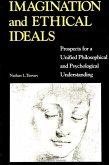One of the principal moral and psychological problems of our time is whether humane ideals can be defended. Loss of faith in the objectivity of ethics has encouraged a sense of hopelessness. The notion that no ideal is better than any other, that a humane commitment has no rational advantage over Nietzsche's contempt for ordinary people, has been accused of leaving our civilization without self-confidence or a purpose. James R. Flynn rejects attempts to salvage ethical objectivity as futile and counterproductive. Instead, he uses philosophical analysis to demonstrate the relevance of logic and evidence to moral debate. He then uses modern social science to refute racists, Social Darwinists, Nietzsche, and the meritocracy thesis of "The Bell Curve." Flynn concludes that the great post-Enlightenment project--justice for all races and classes, the reduction of inequality, and the abolition of privilege--retains its moral dignity and relevance.
Hinweis: Dieser Artikel kann nur an eine deutsche Lieferadresse ausgeliefert werden.
Hinweis: Dieser Artikel kann nur an eine deutsche Lieferadresse ausgeliefert werden.








